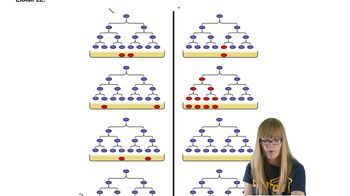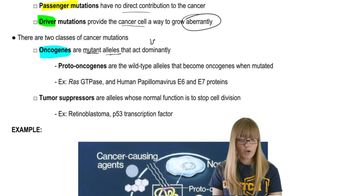What is a spontaneous mutation, and why are spontaneous mutations rare?
 Verified step by step guidance
Verified step by step guidance
Verified video answer for a similar problem:
Key Concepts
Spontaneous Mutation

DNA Replication Fidelity

Environmental Factors and Mutation Rates

Price et al. [(1999). J. Bacteriol. 181:2358–2362] conducted a genetic study of the toxin transport protein (PA) of Bacillus anthracis, the bacterium that causes anthrax in humans. Within the 2294-nucleotide gene in 26 strains they identified five point mutations—two missense and three synonyms—among different isolates. Necropsy samples from an anthrax outbreak in 1979 revealed a novel missense mutation and five unique nucleotide changes among ten victims. The authors concluded that these data indicate little or no horizontal transfer between different B. anthracis strains.
Which types of nucleotide changes (missense or synonyms) cause amino acid changes?
Price et al. [(1999). J. Bacteriol. 181:2358–2362] conducted a genetic study of the toxin transport protein (PA) of Bacillus anthracis, the bacterium that causes anthrax in humans. Within the 2294-nucleotide gene in 26 strains they identified five point mutations—two missense and three synonyms—among different isolates. Necropsy samples from an anthrax outbreak in 1979 revealed a novel missense mutation and five unique nucleotide changes among ten victims. The authors concluded that these data indicate little or no horizontal transfer between different B. anthracis strains.
On what basis did the authors conclude that evidence of horizontal transfer is absent from their data?
Why would a mutation in a somatic cell of a multicellular organism not necessarily result in a detectable phenotype?
Most mutations are thought to be deleterious. Why, then, is it reasonable to state that mutations are essential to the evolutionary process?
Why is a random mutation more likely to be deleterious than beneficial?
